STATE GOVERNMENT
What passed and what didn’t — order extra copies of WSLC Legislative Report for your local
OLYMPIA (April 30, 2019) — The 2019 session of the Washington State Legislature — which featured some major twists and turns, great successes and disappointing failures — wrapped up at midnight on Sunday with the passage of the biennial budget. Importantly, that budget will fully fund state employee contracts and school employee health care coverage.
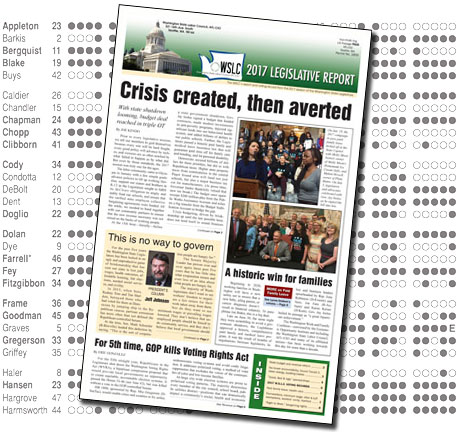 As always, the Washington State Labor Council, AFL-CIO will publish its annual Legislative Report, which describes what happened on working families issues and includes a voting record for each state legislator. A printed copy of that report — which will be available at the end of May — will be mailed to all WSLC-affiliated unions. Affiliates can also order extra copies of the WSLC Legislative Report for their executive boards, shop stewards, or member activists.
As always, the Washington State Labor Council, AFL-CIO will publish its annual Legislative Report, which describes what happened on working families issues and includes a voting record for each state legislator. A printed copy of that report — which will be available at the end of May — will be mailed to all WSLC-affiliated unions. Affiliates can also order extra copies of the WSLC Legislative Report for their executive boards, shop stewards, or member activists.
In the meantime, here’s a very brief summary of how things turned out on items that appeared in the WSLC’s pre-session 2019 Shared Prosperity Agenda.
NOTE: There were several important bills supported by the WSLC and its affiliated unions that do not appear below. They will be described in the full Legislative Report next month.
PRIORITY ISSUES
INITIATIVE 1000 — This Initiative to the Legislature was unanimously endorsed at the Washington State Labor Council’s COPE Convention. It would repeal the state’s ban on affirmative action policies, prevent discrimination in public hiring and wage practices, prevent discrimination in public education, and ensure government contracts are awarded fairly.
PASSED — Thanks to hundreds of calls and emails to legislators, in one of the final acts of the session on Sunday, both houses approved this important measure. However, I-1000 opponents plan to seek a referendum to put the issue on this fall’s ballot.
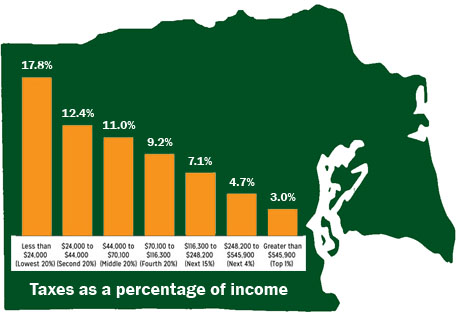 BALANCE OUR TAX CODE — Our infamous tax code is the most unfair and regressive in the nation. Closing the capital gains tax break on sales of stocks/bonds and other special interest tax loopholes, reforming the Real Estate Excise Tax (REET) to make it more progressive, and enacting a Working Families Tax Credit will help balance our tax code and fund state services.
BALANCE OUR TAX CODE — Our infamous tax code is the most unfair and regressive in the nation. Closing the capital gains tax break on sales of stocks/bonds and other special interest tax loopholes, reforming the Real Estate Excise Tax (REET) to make it more progressive, and enacting a Working Families Tax Credit will help balance our tax code and fund state services.
PROGRESS — The Legislature did not close the capital gains tax loophole or fund a Working Family Tax Credit. But lawmakers did make the REET more progressive by passing SB 5998 to lower the tax rate for homes that cost $500,000 or less, and raise it for $1.5 million-plus homes. They also passed Also passed SB 6004, which closes tax loopholes for travel agents and tour operators; SB 5993 that gets profitable oil companies to pay for construction jobs on toxic clean up projects (MTCA); HB 2167 that doubles the B&O tax on large profitable banks; and HB 2158 increased taxes on large tech companies to fund increased access to higher education (more on that below). Those bills must still be signed into law by Gov. Jay Inslee.
SIMPLIFY EMPLOYEE CLASSIFICATION — Incorrect worker classification strips hard-working Washingtonians of earned wages, creates an unlevel playing field for businesses, and siphons away state revenue. By simplifying “independent contractor” definitions and improving enforcement, Washington state will support both workers and law-abiding employers.
DID NOT PASS — SB 5513 (Sen. Karen Keiser) / HB 1515 (Rep. Marcus Riccelli) did not pass. these bills got derailed early on, caught up in opposition to a different bill affecting hair stylists. Read more.
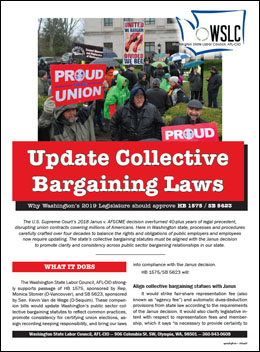 PUBLIC SECTOR BARGAINING — As the federal government upends decades of public sector labor law, Washington should update its bargaining statutes to ensure that our public employees retain the freedom to join together and negotiate a fair return on their work.
PUBLIC SECTOR BARGAINING — As the federal government upends decades of public sector labor law, Washington should update its bargaining statutes to ensure that our public employees retain the freedom to join together and negotiate a fair return on their work.
PASSED — The Legislature approved SHB 1575 (Rep. Monica Stonier), labor-supported legislation that provides post-Janus clarity and consistency for public employee union membership in Washington state. The Legislature also approved SB 5297 granting bargaining rights for assistant attorneys general. (Both await the governor’s signature.) Read more.
KEEP WASHINGTON WORKING — Many of our state’s most important industries rely on the dedicated work of immigrants. The state should bring communities together to develop strategies to protect our immigrant workforce, and secure their rights as workers and as members of our communities.
PASSED — SB 5497 (Sen. Lisa Wellman) was approved, establishing a statewide policy supporting immigrants’ role in the workplace, ensuring their access to state services, and developing strategies to protect our immigrant workforce. (It awaits the governor’s signature.) Read more.
BUILDING UP OUR WORKFORCE
● BUILDING PUBLIC RETROFITS — The Legislature should conduct an inventory of public buildings, and put them on an energy and environmental health retrofit schedule to extend these buildings’ lives, and to create high-quality construction jobs for years to come.
PROGRESS — Although the broad inventory/retrofit program envisioned here didn’t materialize, HB 1257 (Rep. Beth Doglio) passed with labor’s support to create a new energy efficiency performance standard for buildings and to promote retrofitting by offering tax credits for “significant investment” to comply with the new standard.
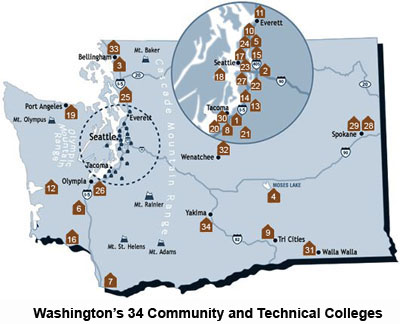 ● INVEST IN POST-HIGH SCHOOL EDUCATION — As the backbone of our workforce development system, our state’s Community and Technical Colleges (CTCs) connect K-12 students with career opportunities. After decades of defunding, we must invest in our CTCs to prepare students to thrive and achieve economic security as our state’s need for skilled and knowledgeable residents increases.
● INVEST IN POST-HIGH SCHOOL EDUCATION — As the backbone of our workforce development system, our state’s Community and Technical Colleges (CTCs) connect K-12 students with career opportunities. After decades of defunding, we must invest in our CTCs to prepare students to thrive and achieve economic security as our state’s need for skilled and knowledgeable residents increases.
PROGRESS — Legislators still have much more work to do in this area after years of neglecting CTCs. However, HB 2158 (Rep. Drew Hanson) took an important step forward, raising $376 million over the next two years from higher business taxes to fund financial aid for low- and middle-income Washington students to attend CTCs and to boost high-demand degree programs including nursing and computer science.
● SECURE SCHEDULING — Workers should be able to have private lives, not just working lives. Short-term schedule management, last-minute cuts to hours, and just-in-time additions to shifts make it impossible for people to plan their lives. Basic standards for scheduling changes and notice will help workers also be more engaged members of their communities and families.
DID NOT PASS — SB 5717 (Sen. Rebecca Saldaña) / HB 1491 (Rep. Nicole Macri) both got hearings, but failed to pass.
MORE EFFECTIVE, ACCOUNTABLE GOVERNMENT
● TAXPAYER PROTECTION ACT — Our state pays hundreds of millions to for-profit corporations and private groups to perform public services. The Legislature should ensure the best return on these dollars by adopting performance metrics and accountability measures for all contracts.
DID NOT PASS — HB 1521 (Rep. Laurie Dolan) / SB 5655 (Sen. Sam Hunt) failed to pass in 2019.
● SIMPLE MAJORITY SCHOOL BONDS — The unreasonable super-majority hurdle for approving school bonds dooms many critical projects to failure, contributing to overflowing classrooms, and unsafe crumbling schools. This harms the quality of education in school districts across the state.
DID NOT PASS — The Senate voted 28-21 in favor of SJR 8201 (Sen. Lisa Wellman) to allow simple majorities of voters to approve school construction projects, but a two-thirds supermajority was required (sound familiar?) to change the state constitution, so SJR 8201 failed.
HEALTHY FAMILIES, HEALTHY COMMUNITIES
● INVEST IN HOUSING — Many communities face a crisis in housing affordability, but the state has failed to equip cities and counties with the tools to solve the problem. The Legislature should streamline zoning and permitting, enact eviction reform, and support public financing of housing and homeless services.
PROGRESS — SB 5600 (Rep. Patty Kuderer), providing more protections to tenants facing eviction, passed and awaits the governor’s signature. They also approved HB 1923, which requires local government to increase density, but gives them several options for how to do so. Meanwhile, the biennial budget significantly boosts the budget of the state’s Housing Trust Fund, which is used to build subsidized housing.
● GUARANTEE HEALTH CARE TO AGE 26 — The Affordable Care Act was designed to guarantee healthcare coverage for young people to age 26 by extending coverage provided by their parents. But Medicaid has left these workers out in the cold. The state should close this loophole and deliver on the promise of the ACA for youth in our communities.
PROGRESS — Legislation to accomplish this specific goal did not pass. However, the labor-supported SB 5526 (Sen. David Frockt) passed to increase the availability of affordable coverage on the individual market by creating a public health insurance option. (Awaiting governor’s signature.)
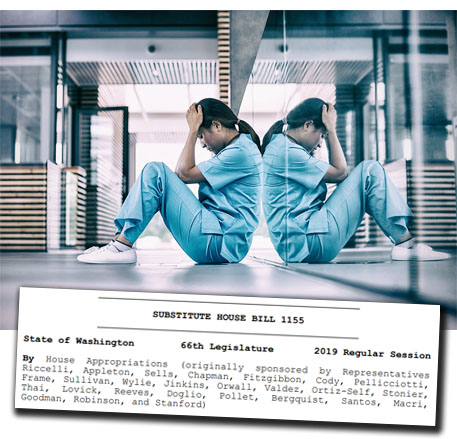 ● HEALTHCARE MEAL & REST BREAKS — Hospitals have failed to ensure that their employees – our healthcare providers, like nurses, medical technicians and other frontline caregivers – are able to take meal and rest breaks. This can lead to life threatening, but preventable, medical errors due to fatigue.
● HEALTHCARE MEAL & REST BREAKS — Hospitals have failed to ensure that their employees – our healthcare providers, like nurses, medical technicians and other frontline caregivers – are able to take meal and rest breaks. This can lead to life threatening, but preventable, medical errors due to fatigue.
PASSED — After 10 years of seeking such legislation, HB 1155 was approved to ensure that nurses and other frontline healthcare workers in Washington state get uninterrupted meal and rest breaks. (Still awaits governor’s signature.) Ironically, an insulting comment by Sen. Maureen Walsh (R-College Place) that nurses “probably play cards for a considerable amount of the day” made headlines, generated national outrage, and helped propel the bill across the finish line. Read more.
● RAILROAD STAFFING — Rail disasters involving trains hauling hazardous materials may have been prevented had more than one worker been assigned to the train. Ending single-member crews for hazardous material trains will limit these derailments and better protect communities.
DID NOT PASS — HB 1841 (Rep. Marcus Riccelli) establishing minimum crew size on certain trains passed the House, 72-24, but failed to get a Senate vote.
● FIRE SERVICE OCCUPATIONAL DISEASE — Our workers’ compensation laws should be updated to reflect the latest science on occupational disease exposure for firefighters, EMTs, and fire investigators.
PASSED — HB 1913 (Rep. Beth Doglio) applies existing occupational disease presumptions for firefighters to EMTs and fire investigators. (Pending governor’s signature.)
JUSTICE FOR WORKERS
 ● REGULATE NON-COMPETITION CONTRACTS — A rapid expansion in noncompetition contracts — up to 20% of all workers are now bound by them — is blocking workers from seeking better jobs. The Legislature should strictly regulate the use of these contracts that limit competition for labor.
● REGULATE NON-COMPETITION CONTRACTS — A rapid expansion in noncompetition contracts — up to 20% of all workers are now bound by them — is blocking workers from seeking better jobs. The Legislature should strictly regulate the use of these contracts that limit competition for labor.
PASSED — HB 1450 (Rep. Derek Stanford) passed to create new restrictions of non-compete agreements, including limiting their duration, improving disclosure, exempting most franchise workers, and banning their use for jobs that pay less than $100,000/year. (Pending governor’s signature.)
● OVERTIME FOR FARM WORKERS — The people doing some of the most strenuous work in our economy — harvesting our food — are denied access to overtime pay. Washington should close this discriminatory loophole.
DID NOT PASS
● WORK VIOLENCE / SEXUAL HARASSMENT — Lawmakers need to lead the way on preventing abusive treatment, bullying, inappropriate behavior, and sexual harassment that Washington workers face on the job.
PASSED — SB 5258 (Sen. Karen Keiser) requires companies that employ custodians, security guards, hotel or motel housekeepers, or others who spend a majority of their working hours alone to adopt a sexual harassment policy and provide sexual harassment training. (Pending governor’s signature.)
RETIREMENT SECURITY
 ● LONG-TERM CARE TRUST ACT — Long-term care in Washington is very expensive. The Trust Act would give families the security of knowing they will get the care they need when they need it most, without having to spend down their life savings to access Medicaid.
● LONG-TERM CARE TRUST ACT — Long-term care in Washington is very expensive. The Trust Act would give families the security of knowing they will get the care they need when they need it most, without having to spend down their life savings to access Medicaid.
PASSED — HB 1087 (Rep. Laurie Jinkins), the Long-Term Care Trust Act, is first-in-the-nation legislation to reduce the biggest uninsured risk Washingtonians now face. Workers will begin paying a premium of 58 cents per $100 of income in 2022, and vest after five years. Long-term care benefits would first be payable in 2025. The total benefit available would be nearly $37,000, which could be used toward a comprehensive array of long-term care services and supports. (Pending governor’s signature.)
● PLAN 1 COLA & PLAN 2 DEFAULT — In 2018, the Legislature finally funded a modest one-time COLA for Plan 1 retirees. In 2019, the COLA should be made permanent. Also, the state should change the default retirement plan for public workers from Plan 3 to Plan 2 to ensure more retirees are protected by defined-benefit pensions.
DID NOT PASS — Bills to provide a COLA for Plan 1 retirees did not pass.
PASSED — SB 5360 (Sen. Steve Conway) was approved to change the default retirement plan for public workers from Plan 3 to Plan 2, if they fail to choose a plan within 90 days, to ensure more retirees are protected by defined-benefit pensions. (Pending governor’s signature.)
● MEDICARE SUBSIDY — To support our seniors’ against healthcare inflation, the state should increase the financial support for retired public employees.
PROGRESS — The Medicare subsidy was raised from $168 to $183/month.
As mentioned above, many important labor-supported bills were not included in this pre-session this Shared Prosperity Agenda, including the 100% clean energy bill, increased oversight of H-2A agricultural visas, and many others. Look for a more comprehensive report next month when the WSLC 2019 Legislative report is published.





